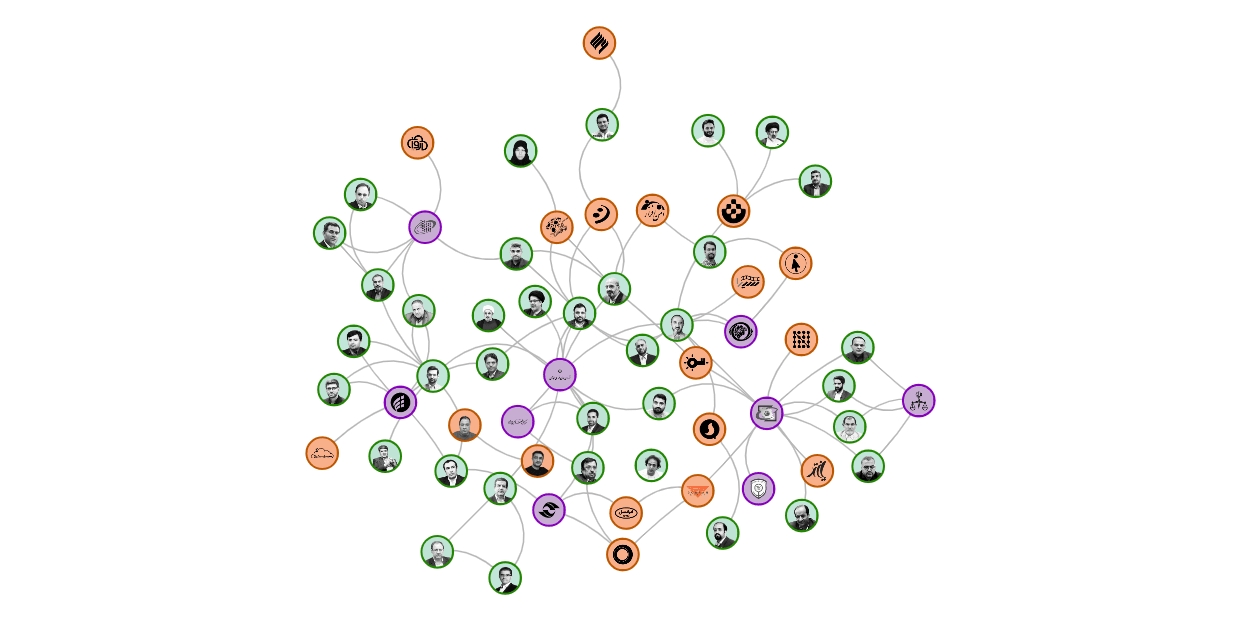Introducing Internet Abad: an initiative to hold Iran’s tech sector accountable

Internet Abad is an ASL19 initiative dedicated to promoting accountability and transparency in Iran's information and communication technology (ICT) sector. The initiative’s primary objective is to unravel the intricate network of entities and individuals behind Iran’s online censorship, shutdowns, surveillance and more. In this blog post, rather than describing the extent of internet censorship and state surveillance programs in Iran, we will explain how we identify and hold accountable those that play a part in Iran’s information control apparatus.
What makes Iran’s ICT sector different?
Over the past two decades, the Islamic Revolutionary Guard Corps (IRGC) and para-governmental foundations (Bonyads) associated with Iran’s Supreme Leader have been increasingly involved in Iran's ICT sector and startup scene. Not only have these entities operated through various front companies, they have become key investors in the sector – a move that allows for easier alignment between companies’ directions and the authorities’ agenda.
The intertwined relationships between Iran’s authorities and ICT sector also means that the government holds great power to leverage the expertise and infrastructure of ICT companies to carry out internet censorship and other information control measures. It is important to note that this relationship is not simply one-sided. Through collaborating with the government, private entities – including Mobile Network Operators, public venture capitalists, tech incubators, internet service providers (ISPs), and major tech corporations – play crucial roles in shaping and implementing internet policies in Iran. In fact, decision-makers within these companies, such as board members, executives, and major shareholders, often already have existing personal and/or professional affiliations with each other and with the Revolutionary Guards. This raises concerns regarding potential conflicts of interest, particularly if these key decision-makers stand to benefit from government funding and procurement contracts.
These existing and developing relationships typically don’t receive enough public attention, resulting in an informational void that adds to a broader lack of public understanding about the entities steering Iran’s censorship efforts. To bridge this gap, Internet Abad adopts three data-driven approaches:
Approach 1: Profile creation through data scraping and research
To provide a comprehensive overview of the ICT sector in Iran, Internet Abad partners with experts to extract and refine data related to registered companies in the country. Through this collaborative effort, we gather valuable data that sheds light on the sector, its key players, and their historical developments. We also utilize various other data sources to verify and congregate data about different entities and individuals.
Subsequently, the data and information is published as profiles on the Internet Abad website. These profiles cover a diverse array of influential actors shaping Iran's digital landscape, including private companies, major venture capitalists, ISPs, government institutions and officials, etc. Each profile offers insights into an entity’s history or an individual’s education and professional backgrounds, personal affiliations, as well as potential conflicts of interest.
At the time of writing (December 2023), Internet Abad has 63 profiles, including 36 individuals, 18 companies, and 9 government/public institutions. Profiles that are connected are shown in a network graph to visualize the relationships.
Moreover, if an individual or entity is on the U.S. Department of Treasury's sanctions list, relevant sanction information is also included on their profile pages such as their position in the government, their decision-making authority within government institutions, and any relevant human rights violations.

Approach 2: Countering ICT-related misinformation through fact-checking
Besides the intricate, hidden network within the ICT sector, another barrier that impedes civil society’s capacity to hold actors accountable is the prevalence of mis/disinformation in Iran. It is not a surprise that with the lack of press freedom, officials and powerful figures in Iran often perpetuate false and misleading narratives that obscure the true extent of online censorship and digital rights violations in the country.
To foster a culture of accountability, our research team actively fact-checks statements from influential figures in the ICT sector and publishes them on the Factnameh website, which receives over 170,000 pageviews per month on average. The fact-checks help people in Iran gather timely, accurate information about information control and counter tactics that seek to redirect public attention away from Iran's stringent censorship and surveillance measures. For instance, officials have presented the public with misleading data about internet speed in Iran to paint a false picture. Another recurring theme involves the use of “whataboutism” and false comparisons to accuse Western governments of enacting state-backed censorship. To date, Factnameh's website under the Internet Abad initiative has published 78 fact-checks addressing these narratives.
Approach 3: In-depth research on entities, individuals, and ICT topics less explored in the sector
To further dissect popular narratives as well as the intertwined relationships between different ICT stakeholders in Iran, we also publish detailed reports on factnameh.com. These reports focus on important yet less-explored topics, particularly those related to censorship and digital human rights violations by ICT actors.
One notable example is an in-depth investigation into the Cloud Service company ArvanCloud (or Abr Arvan) and its role in advancing Iran’s National Information Network project – a highly restricted national intranet that remains operational during internet shutdowns in Iran. Compelling evidence shows that Abr Arvan plays a pivotal role in providing the necessary infrastructure to aid the Islamic Republic’s censorship schemes and in lowering the social and economic costs of internet shutdowns. The published research also uncovered the involvement of the Germany-based tech company Softqloud (allegedly a branch of Abr Arvan) which resulted in the EU officially sanctioning Abr Arvan in November 2022.
Misconduct and human rights violations committed by Iran’s ICT sector have immense effects on the civil society – socially, economically, politically and beyond. To resist the increasingly restrictive information landscape requires more open information. Internet Abad is one way to help the civil society in Iran navigate the sophisticated systems of oppression and call out those whose actions and narratives serve to silence and to concentrate power. To learn more about the initiative, check out the Internet Abad website (Persian).